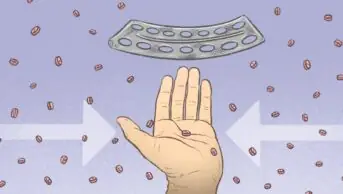
BSIP SA / Alamy
Four out of ten people would be willing to accept some degree of risk of immediate death rather than having to take a daily pill to prevent cardiovascular disease (CVD), and almost one in ten people would be prepared to sacrifice two years of life to avoid a daily pill.
These are some of the findings of research[1]
published in Circulation: Cardiovascular Quality and Outcomes, offering insight into the problem of medication non-adherence.
In seeking to understand the psychological factors at play in medication adherence, researchers at the University of California San Francisco (UCSF) and the University of North Carolina at Chapel Hill asked 1,000 people aged 30 years or over how much of their life they would be willing to forfeit to avoid taking daily medication; similarly, how much money they would be prepared to pay, and the risk of death they would be willing to accept.
Some 8.2% of participants said they would be willing to shorten their life by as much as two years, while around 21.6% would trade between a week and a year. Some 12.8% said they would accept a minimal risk of death (0.0001% risk), while 9.0% said they would take a 10% chance of death. Most people (62.1%), however, were not willing to gamble any risk of immediate death. On average, the participants were prepared to pay US$1,445 to avoid taking a pill each day for the rest of their lives, with 21.9% saying they would pay US$1,000 or more, including 2.8% who would pay US$25,000. Some 42.8% would not be willing to pay anything.
The ultimate aim of the research was to consider the implications for medication strategies of such perceptions. “We tried to measure how much the act of taking a pill — obtaining it, remembering to take it and actually taking it – interferes with one’s quality of life,” says lead author Robert Hutchins, an internal medicine physician at UCSF. “The act of having to take a daily pill can have a large effect on an individual’s quality of life. And on a population level, even for the small reductions in quality of life like those found in this study, that effect multiplied across millions of people can have very large effects on the cost-effectiveness of that drug for a population.”
Cumulatively, the impact of non-adherence is known to be significant: healthcare costs among medication-compliant patients has been measured as 47% less than that of the least adherent patients[2]
. In the United States, 51% of people treated for hypertension are believed to be adherent to their long-term therapy, with up to a half of patients discontinuing statins within a year of treatment initiation[3]
. The cost to the healthcare system was estimated to be US$105.8bn, or US$453 per adult, in 2010
[4]. In 2011, the global pharmaceutical industry was losing an estimated US$564bn annually as a result of medication non-adherence, according to consultancy firm Capgemini based in Paris.
For healthcare providers, understanding the factors at play in non-adherence is important: Hutchins and his team therefore determined the mean utility value — a statistical measure of a population’s willingness to engage with a service or intervention — of taking a pill daily for CVD prevention, and found it to be approximately 0.990 to 0.994.
“Knowing this value and the distribution of responses may be useful for researchers and policymakers evaluating preventive interventions for CVD, including the decision about taking aspirin or statins, and should be considered in addition to information about the decrements in utility from adverse outcomes such as gastrointestinal bleeding or myopathy,” they conclude.
References
[1] Hutchins R, Viera AJ, Sheridan SL et al. Circulation: Cardiovascular Quality Outcomes. 3 February 2015.
[2] CDC Medication Adherence in Chronic Cardiovascular Disease conference presentation, March 2013, citing: Sokol MC, McGuigan KA,Verbrugge RR, et al. Impact of medication adherence on hospitalization risk and healthcare cost. Medical Care, 2005;43.6:521–530.
[3] CDC Medication Adherence conference presentation, March 2013, citing: Choudhry NK, Avorn J, Glynn RJ, et al. Full Coverage for Preventive Medications after Myocardial Infarction. New England Journal of Medicine 2011;365:2088-2097 and: Yeaw J. Comparing adherence and persistence across 6 chronic medication classes. Journal of Managed Care Pharmacy 2009;15(9):728–740.
[4] CDC Medication Adherence in Chronic Cardiovascular Disease conference presentation, March 2013, citing: Nasseh K, Glave Frazee S, Visaria J et al. Cost of medication nonadherence associated with diabetes, hypertension, and dyslipidemia. American Journal of Pharmacy Benefits 2012;4.2:e41–e47.


